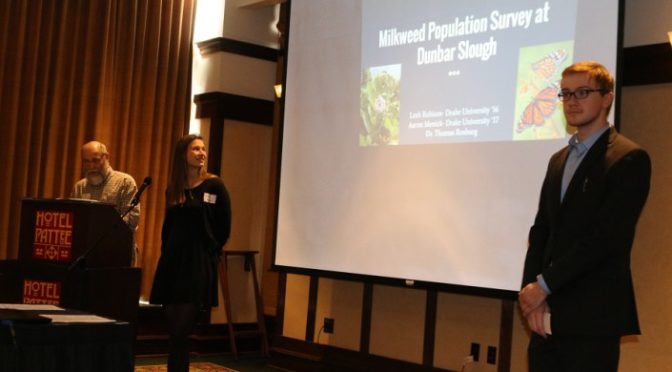Environmental science and policy students present at association meeting
On March 5, the Raccoon River Watershed Association held its annual meeting in Perry, Iowa. Drake environmental science and policy students Andrew Rupiper, Gabrielle Brodek, and Leah Robison as well as Thomas Rosburg, professor of biology and chair of the department, presented.
More information can be found at http://theperrynews.com/large-turnout-for-annual-raccoon-river-watershed-association-conference/
Ann Cravero joins prestigious summer program in Europe
Ann Cravero, associate professor of voice and director of opera theater, was accepted as assistant director to Sherrill Milnes on Mozart’s opera, Don Giovanni with the Prague Summer Nights: Young Artist Music Festival this summer. Ann will participate in performances, master classes, workshops, concerts, and recitals in venues and halls in the Czech Republic, including fully staged performances of Don Giovanni in the Estates Theatre and Suor Angelica/Gianni Schicchi at Simon & Jude Church (semi-staged) in Prague as well as orchestra concerts in Tabor, Dvorak Hall in Prague.
The opportunity to direct alongside whom many consider the greatest singer to portray the role of Don Giovanni (Sherrill Milnes) at the theater that Mozart premiered Le Nozze di Figaro and Don Giovanni is a great honor. It should be noted that Sherrill Milnes received his bachelor of music at Drake University. This festival will provide Ann the opportunity to learn from some of the greatest singers and conductors in the field of professional opera, including conductors James Nardolillo and James Burton, clarinetist Walter Seyfarth, violinist Rodney Friend, and coach Scott Rednour. A complete list of faculty can be found online.
Tamales and foreign language
On Thursday, Feb. 25, professors Eduardo Garcia and Lourdes Gutiérrez-Nájera gave a tamales-making demonstration for Alpha Mu Gamma, the Drake chapter (Xi Kappa) of the international honor society for foreign languages.
The goal of the event was to build community, specifically in relation to foreign languages. Social events such as this that are open to all Drake students give the opportunity to educate others about aspects of other cultures and thereby grow the world languages department.

